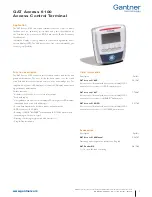
Programming
CX8030 / CX8031
60
Version: 1.6
Offset
Meaning
0x00.0
StationNonExistent: slave did not reply to the last
telegram
0x00.1
StationNotReady: slave still processing the Set_Prm /
Chk_Cfg telegram
0x00.2
CfgFault: slave signaling a configuration error
0x00.3
ExtDiag: extended DiagData available and valid
0x00.4
NotSupported: slave does not support a feature
requested via Set_Prm or Global_Control
0x00.5
InvalidSlaveResponse: slave response not DP-
compatible
0x00.6
PrmFault: slave reports a parameterization error
0x00.7
MasterLock: slave currently exchanging data with
another master
0x01.0
PrmReq: re-parameterize and reconfigure slave
0x01.1
StatDiag: slave signaling static diagnosis / DPV1
slave application not yet ready for data exchange
0x01.2
PROFIBUS DP slave
0x01.3
WdOn: DP watchdog on
0x01.4
FreezeMode: DP slave in freeze mode
0x01.5
SyncMode: DP slave in sync mode
0x01.6
reserved
0x01.7
Deactivated: DP slave has been deactivated
0x02.0
reserved
0x02.1
reserved
0x02.2
reserved
0x02.3
reserved
0x02.4
reserved
0x02.5
reserved
0x02.6
reserved
0x02.7
ExtDiagOverflow: too much extended data present
0x03
MasterAdd: station address of master with which
slave is exchanging data
0x04, 0x05
IdentNumber
from 0x06
Extended DiagData
Extended DiagData
A distinction is made in the Extended DiagData between identification diagnosis, channel diagnosis and
manufacturer-specific diagnosis. The first byte indicates the type of the diagnosis and the length of the
associated data. Several diagnostic types can also follow one another in the Extended DiagData.
Header Byte
Bit
Meaning
0-5
Length of the associated diagnostic data, including
header byte
6-7
0 = manufacturer-specific diagnosis (DPV1 is not
supported) or DPV1 diagnosis (DPV1 is supported
(DPV1_Enable = 1) in associated GSD file)
Module diagnosis
Channel diagnosis
Revision number
















































